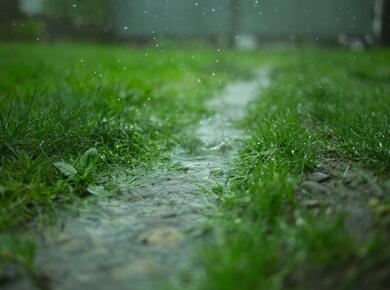Posted: December 20, 2023
You are invited! Join us for Climate Pollinators, a webinar series on creation care. See below!
January to April is the rainy season in Guayaquil, a port city on the coast of Ecuador. But this past year, says Sara Noemi Viteri Moreno, a member of Iglesia Jesus el Buen Pastor (Jesus the good shepherd, a Mennonite church) in Guayaquil, it hardly rained at all.
Sara Noemi Viteri Moreno is an environmental engineer who helps lead the youth program at her church.
“It has stopped raining the way it used to,” she says, “and that makes it so it’s hotter.” She suspects these trends are linked to something else: decreasing tree cover in the city.
“Close to the church, there used to be these trees that were really old,” Sara Noemi Viteri Moreno says. But about five years ago, the city removed them.
Since then, there is less shade and the increased heat is notable, Sara Noemi Viteri Moreno says. It’s not just those trees. All around the city, trees have been cut down as the population increases. “Those trees brought rain to this area,” she says.
With over three million residents, Guayaquil is the largest city in Ecuador, and it’s constantly growing. Many of the newcomers are Ecuadorians from rural areas, but the city has also been receiving an increasing number of refugees from outside the country, mainly from Venezuela.
Since 2015, Ecuador has received more than 500 000 refugees fleeing political turmoil, violence, poverty and economic and social insecurity in Venezuela. In Guayaquil, many end up living by the rivers, under bridges and in parks.
United Nations Climate Change (UNFCCC) describes climate change as a threat multiplier. It “worsens social, economic and environmental pressures, leading to social upheaval and possibly even violent conflict.”
Immigration of refugees from Venezuela means that destinations like Guayaquil become more crowded. People cut down forests and build near rivers. This leads to problems like landslides and flooding, says Sara Noemi Viteri Moreno.
In the church, “We aren’t very conscious about what is happening.”
However, they are supporting Venezuelan refugees. Over the years, the church building has served as a temporary home for families searching for work and housing. Congregants have provided newcomers with mattresses to sleep on, food to eat and clothes to wear.
“Migration means there are more people in one place,” says Sara Noemi Viteri Moreno. “There aren’t any more places to get established anymore.”
“This is a part of climate change. It’s one of the problems we can start with.”
—Sierra Ross Richer is a member of Waterford Mennonite Church, Goshen, Indiana, USA. She is an intern with the Anabaptist Climate Collaborative (ACC). This story from the ACC’s Lent Climate Pollinator Series: Global Anabaptist Stories on Climate Change is reprinted with permission.
Click here for recordings from previous webinars:
- 17 October 2023 –Africa focus with Sibonokuhle Ncube
- 14 November 2023 —Asia focus with Nindyo Sasongko
- 12 December 2023 – Europe focus with David Nussbaumer
|
You are invited! Join us for Climate Pollinators, a webinar series on creation care. MWC’s Creation Care Task Force members from each region will host one hour of storytelling and Q&A. Church members from around the world will share how they are affected by climate change – and responding with resilient action and gospel hope. Other featured stories for the Latin America webinar Each webinar will take place at on Tuesday at 14:00 UTC (click here to find the time in your region). Register here: |


Join the Conversation on Social Media
FacebookTwitterInstagramFlickrYouTube